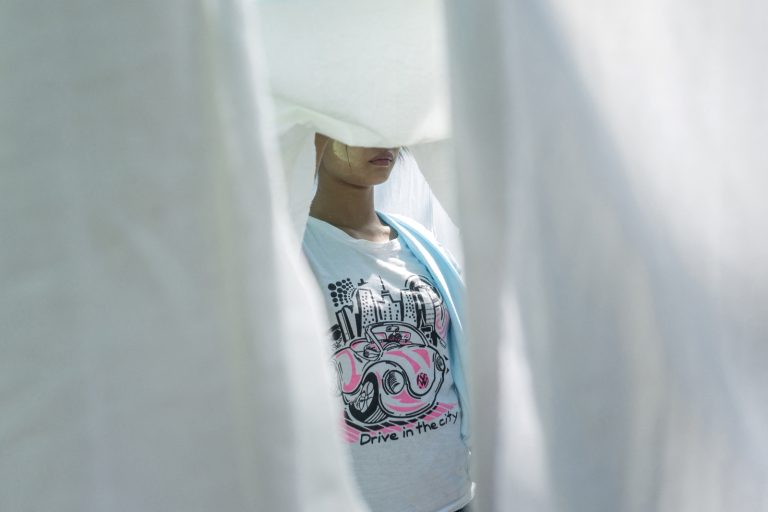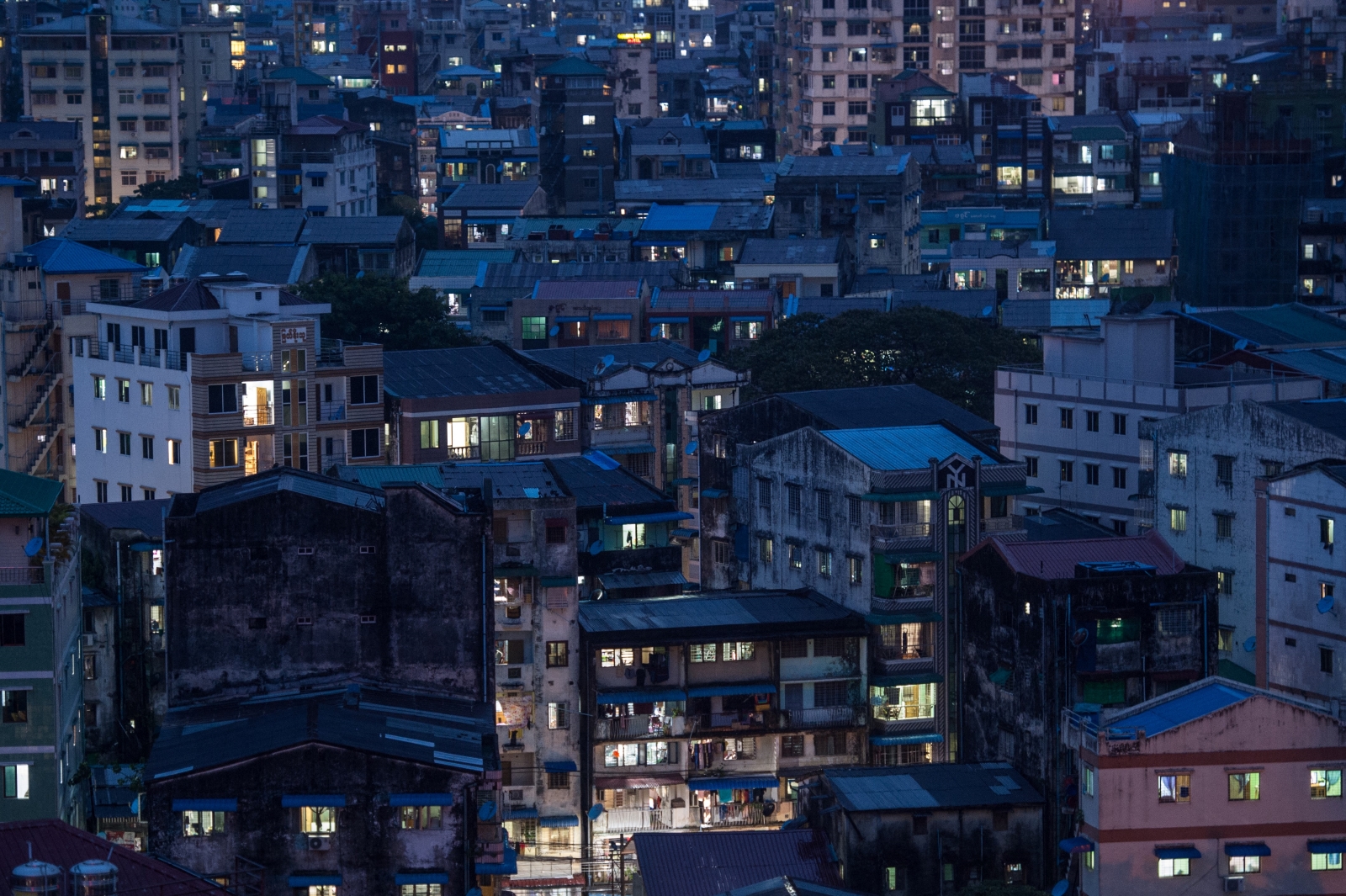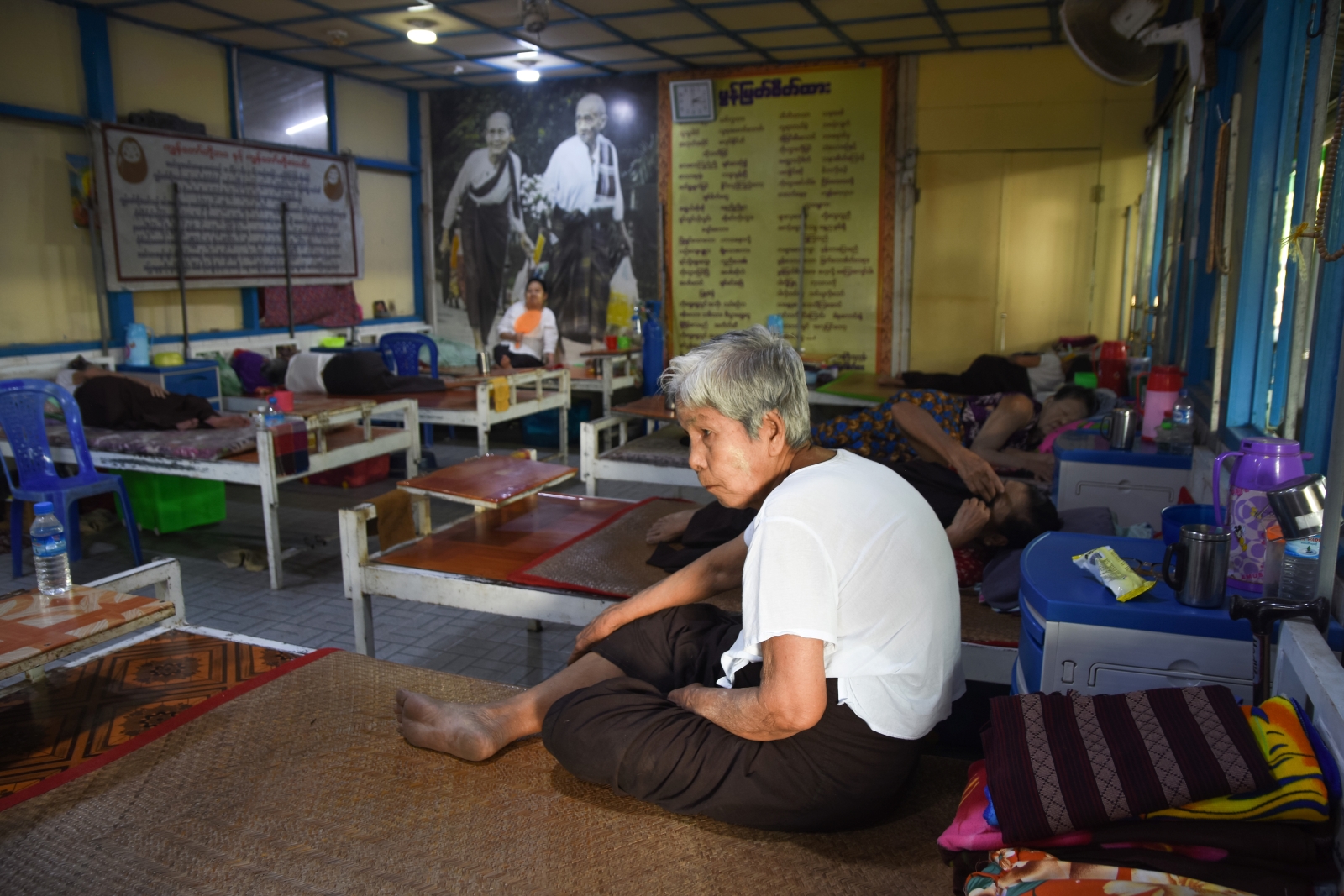A luxury housing bubble helped to enrich members of the military and their associates in the decade of reforms that preceded the 2021 coup, but a subsequent exodus of foreign professionals has tanked the rental market – possibly beyond repair.
By FRONTIER
With rows of smart houses with large yards and reliable electricity, on winding lanes secluded from Yangon’s main thoroughfares, Golden Valley has long been one of Yangon’s most desirable neighbourhoods. Located in Bahan Township with Inya Lake to its north, Dhammazedi Road to its south and Kabar Aye Pagoda and Inya roads to its east and west, its location – equidistant from the riverside downtown and the airport – has added to its appeal.
Golden Valley has been home to Myanmar’s top businesspeople, as well as its senior politicians and military officials before the new capital Nay Pyi Taw was inaugurated in 2005. When political reforms launched in 2011 delivered Myanmar from decades of isolation, the neighbourhood became increasingly attractive to newly arriving foreign renters as well.
The new influx of foreign professionals working for the United Nations, international NGOs and global business conglomerates had hefty housing allowances and salaries, fuelling a luxury rental bubble.
At its peak, homes in Golden Valley were being rented for as much as US$10,000 a month and sale prices for certain tower blocks became even more expensive than New York City. Rents eased gradually from 2016, but the military coup in February 2021 caused demand to collapse. Expat-heavy areas like Golden Valley emptied out, leaving once highly desired homes vacant and pushing prices down by more than 50 percent, according to two real estate agents who spoke to Frontier.
The drop has largely affected wealthy elites that own high-end property, including those with close connections to the military, demonstrating how the coup has – in some ways – been counter to the military’s economic interests.
Some landlords have put their homes on the market, where prices have gone up, as many try to offload the unreliable kyat for more stable assets like property and gold. Others, seeing property more as a long-term investment, have opted to leave their homes empty for now and are even eyeing new purchases.
The two-tiered rental market
Like many other cities in Southeast Asia, Yangon has a two-tiered rental market, with foreign professionals often paying far more for modern homes while locals rent cheap apartments or shared dorms. But the gap was even more pronounced in Yangon than some of its regional neighbours, partly because property rentals were limited to begin with.
“The rental market is complicated because so few people in Myanmar actually rent the houses and condos,” said Mr David Ney, who worked as a real estate agent in Yangon from 2009 to 2015. “Most people in Myanmar own their own property, live with family or rent in hostels.”
“The average renters in Yangon are workers who are sharing properties between 15 people paying 15,000-30,000 kyat [$7-14] a month,” said Ney, while “elite renters”, mostly foreigners, were renting property for between $200 to $7,000 per month.
While many derived their wealth controversially, the upper-class demographic of the homeowners in Golden Valley was a key part of the appeal for foreign renters.
“A good percentage of the owners in Golden Valley have experience living abroad and are a bit better able to cope with the tastes and demands of foreign tenants, while also speaking English,” said Mr Stuart Deed, who worked as a real estate agent in Yangon from 2013 until 2021. “This makes finding a good house and an agreeable landlord much easier.”
It was a similar story in the neighbourhood around Yaw Min Gyi Road, in Dagon Township closer to downtown, which Deed noted was especially popular “with younger or unattached expats” given its proximity to bars and restaurants.
But the pull of these areas was coupled with a push. Ney explained that foreigners were “funnelled” to Golden Valley and Yaw Min Gyi, with one possible reason being that these areas were “less densely populated”.
While ward administrators in downtown areas would enforce housing registration rules that would make it almost impossible to rent a unit to a foreigner, administrators in Golden Valley and Dagon would look the other way, noted Ney.
Dr Elizabeth Rhoads, a researcher at Lund University in Sweden, said the restrictions elsewhere in the city were reinforced following the mass demonstrations against military rule in 2007. After this uprising, dubbed the Saffron Revolution, the regime wanted to keep foreigners away from potential areas of unrest.
“A lot of places, especially after 2007, were off-limits to foreigners. You were definitely not allowed to live in Pansodan or Kyauktada at that time unless you had some really special agreement with your administrator,” said Rhoads, referring to two downtown townships. “But Golden Valley was one area where you could live without restriction.”
The area, as well as Yaw Min Gyi, were also known for having reliable electricity, even at times when most townships only had power for three or four hours a day.
“[Golden Valley] never got the power turned off when there were power cuts. There are too many VIPs there, too many generals with houses there, too many generals’ kids,” said Rhoads. “I lived there in 2010 and our power went off once and when it went off our landlord got so angry.”
Besides the generals and their children, Golden Valley has hosted elites from across the political spectrum. Pro-democracy icon Daw Aung San Suu Kyi’s famous residence is on the northern tip of the valley, on the banks of Inya Lake. Meanwhile, Senior General Min Aung Hlaing, who overthrew and imprisoned her during the 2021 coup, keeps a mansion on the western edge, on Inya Road, although he spends most of his time in Nay Pyi Taw.
Reuters reported in 2021 that former air force chief Maung Maung Kyaw raised his son Ivan Htet in Golden Valley. The latter’s business interests include a private firm that supplies the military.
Yangon’s land registry records from 1993 to 2014, obtained by the transparency collective Distributed Denial of Secrets and shared with Frontier by human rights group Justice For Myanmar, also show that many properties in the area are owned by military officers, including colonels and lieutenant colonels.
The homeowner demographic meant that renting property in Golden Valley would often put cash directly into the pockets of former and current military officials and their associates. In 2013, UNICEF began renting new office space in the neighbourhood at nearly $90,000 per month from General Nyunt Tin, a minister and intelligence officer under former dictator Than Shwe. Until 2021, the European Union’s ambassador’s residence was rented from the family of Ne Win, Myanmar’s first military ruler, who seized power in 1962.
A source familiar with UN operations in Myanmar, who spoke to Frontier on the condition of anonymity, explained that “there weren’t too many places that could house 100-200 people” and “anything big enough was either directly or indirectly linked to the military or cronies”.
However, the source noted that while UNICEF hasn’t announced any plans to move, other UN branches, like the UN refugee agency, have moved to new offices in the Kantharyar Centre, owned by the Asia Myanmar Shining Star Investment Company.
The EU has also moved its office from Hledan Centre to Kantharyar Centre. While not in Golden Valley, the Hledan location was being rented from Asia World, a crony conglomerate founded by notorious drug trafficker Lo Hsing Han and run today by his son.
Plummeting prices
At the onset of the COVID-19 pandemic in early 2020, some foreigners chose to weather the storm, but many others quickly packed up their belongings and left. The exodus, coupled with border closures that blocked new arrivals, started to push down prices in expat-heavy areas like Golden Valley.
Before the market had a chance to recover, the coup threw the economy into further uncertainty. Countries issued warnings against travelling to Myanmar, and UN and diplomatic missions downsized their operations from family stations to necessary personnel only.
With so few expats in the country, finding tenants in areas like Golden Valley became extremely difficult and prices dropped, said Ms Jane*, a real estate agent in Yangon. She estimated that rental prices have gone down by 50-60pc since the coup, adding that her agency stopped working in Golden Valley because so few foreigners were looking to rent property.
Daw Htet*, a doctor and Golden Valley resident who spoke to Frontier through an intermediary for safety reasons, said she had to slash the rental cost of one of her two properties by two thirds to entice a tenant.
“In the last couple of years, it has been harder to find a tenant because most of the expats have left the country. In 2015, I rented my house for $3,000 per month, but now I only rent it for less than $1,000,” she said.
Jane added that many of the remaining foreigners in Myanmar have opted to rent serviced apartments or condominiums that have back-up generators. Since the coup, even areas like Golden Valley and Yaw Min Gyi have begun experiencing four-hour power outages every day, said Ms Lucy*, another Yangon real estate agent. Jane said only a few landlords use generators because of the cost of fuel, which has surged since the coup.
The source familiar with UN operations noted that because many staff are now “single occupants”, they no longer need a large space for families and prefer the convenience of a serviced apartment, which, along with reliable electricity, often also includes internet.
Yankin Township, just north of Bahan and east of Inya Lake, has become increasingly popular post-coup thanks in part to the large number of condominiums. Jane said that the residential towers in Golden City, a massive complex that also includes a shopping mall and a hotel, are “now all occupied”. Lucy said that more of her clients have also become interested in Yankin recently, with many wanting to live near Myanmar Plaza, a large shopping mall that includes popular bars and restaurants.
“There is so much maintenance with houses, but in the condo they don’t need to worry about security, car parking, the generator – everything is already there,” she said.
But even with the demand for condominiums rising, the overall outlook for the rental market in Myanmar remains bleak.
“For the market to recover – I don’t think it ever can. It was a fluke that so many people came in when they did at a time [when] the housing market was at a place where there was very limited supply in relation to the rapid high demand,” said Ney. “Now there is more stock than ever before and more to come online when paused developments eventually get finished.”
Parking capital
While some homeowners depended on the passive income from renting property and have struggled with the drop in prices, Jane said others who are “very rich” have decided to keep their homes empty rather than renting them at a discounted rate.
They had cashed in on the rental bubble, but most of them hadn’t originally intended to rent their properties and don’t mind leaving them vacant now.
“People that bought houses across the country didn’t buy them to rent them to foreigners at the time,” said Ney. “They bought them because they wanted to park their capital somewhere. The kyat has at many times devalued and deflated over the course of most housing owners’ lives, so you buy property to park your money and have a little nest egg.”
With the kyat devaluing from around 1,300 to the dollar pre-coup to a current market rate of more than 3,000, this impulse has returned with force.
Dr Russell Toth, a senior lecturer at the University of Sydney, explained that investing in real estate and gold is common in less stable economies like Myanmar where “people want to park their wealth in some kind of asset that won’t drop in value too much.”
Jane explained that wealthier homeowners are looking to buy more property and less wealthy homeowners, now in need of regular income due to dropping rental costs, are looking to sell.
This trend has boosted the buyers’ market, with some agents who had previously only worked in rentals now turning their attention to sales. Lucy, who only started selling property after the coup, said that she has found it “much easier to sell houses” than to rent them out.
Some wealthier people have also started parking their capital in other countries’ property markets. Last year, Myanmar nationals were ranked fifth among new condominium owners in Thailand, accounting for 3.6pc of the market.
“People want to put their kyats into real estate but don’t want to invest it all in Myanmar. While some may believe that the Myanmar real estate market will never collapse, others want to diversify,” said Ms Vicky Bowman, director of the Myanmar Centre for Responsible Business.
Toth of the University of Sydney added that the pool of prospective buyers is likely even larger, but the “risk and difficulty” of getting large sums of money out of Myanmar legally has kept some investments inside the country.
The junta’s imposition last year of capital controls and foreign currency restrictions, aimed at shoring up its dwindling reserves, have made it harder for people in Myanmar to access the currency needed to buy overseas property.
“It would be hard to [move money] legally. You could try and do it illegally by liquidating your assets in Myanmar and converting them into some kind of cash or gold and smuggling that over the border but that’s obviously going to carry risk,” said Toth.
“If there’s a 10pc chance I get caught or someone takes all my money, I’d rather just take my chances with purchasing land in Myanmar.”
Meanwhile, the desire to park capital in real estate, whether in Myanmar or abroad, can result in individuals who are asset rich but cash poor – a phenomenon where someone appears wealthy on paper but has little to no disposable income. Toth explained that this can harm the overall economy.
“The problem right now is there’s way too much money in real estate; it’s over-invested. Rather than that capital sitting at banks where they can re-lend it out to entrepreneurs and businesses, the capital is just sitting in real estate,” explained Toth. “And if people don’t have much cash, it’s going to limit their ability to buy stuff and that’s going to limit the demand for different products, so that could harm businesses that would be the recipients of that money.”
* denotes a pseudonym for security reasons







